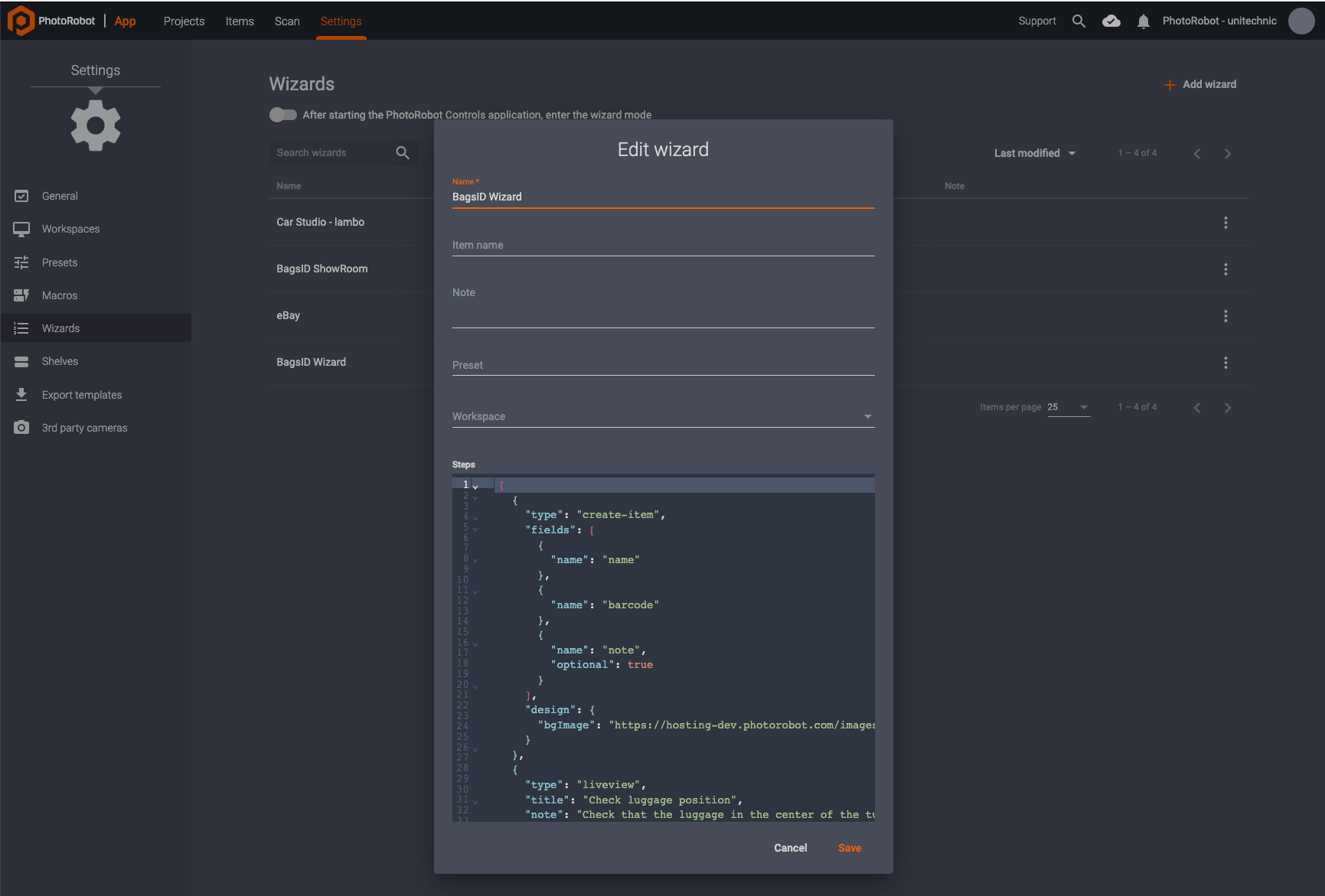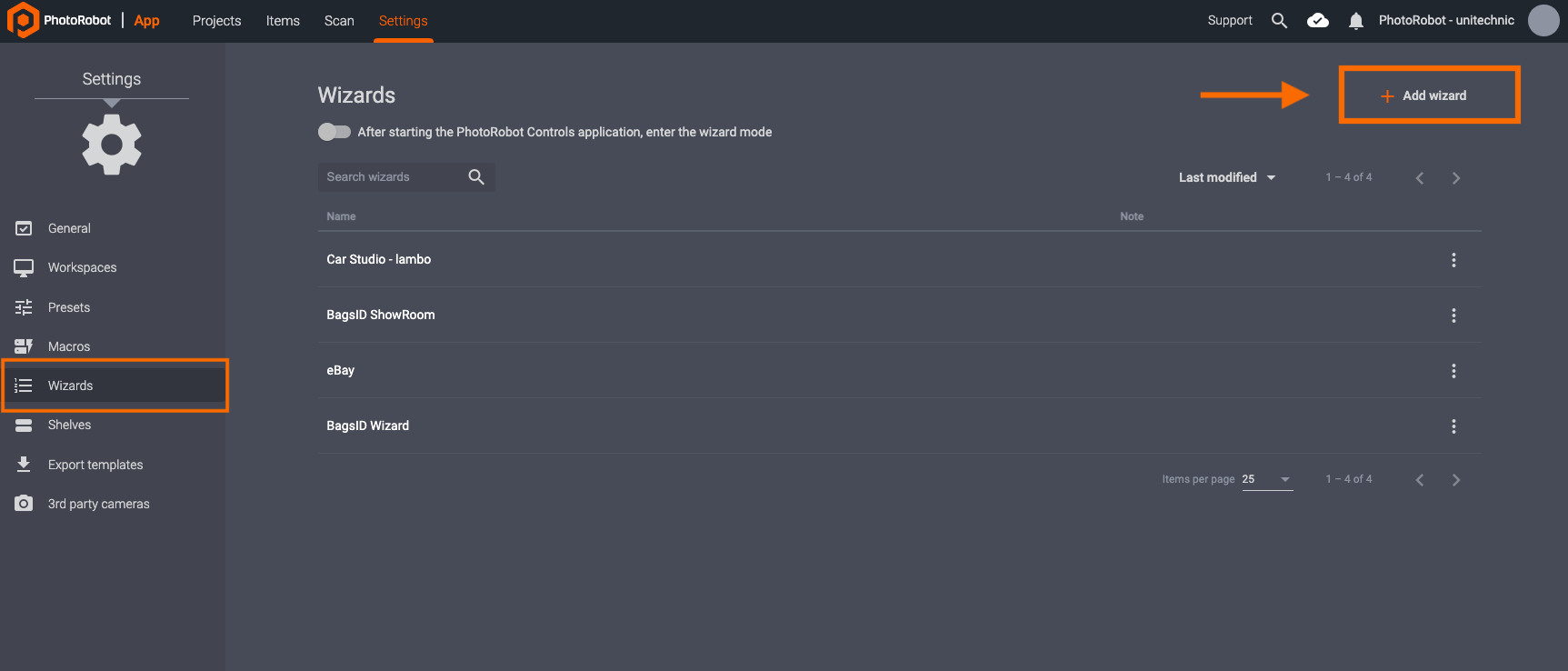PhotoRobot Controls App - Wizard Mode Configuration
In PhotoRobot Controls App (further referred to as “CAPP”), Wizard mode utilizes a series of wizard steps to guide users through various tasks. These steps are defined in a JavaScript-like language format, and can be scripted by PhotoRobot consultants for custom functionality. Users can also script basic functions for initial experiments or simple setups.
Note: The following user manual provides technical instructions on how to configure operator steps in wizard mode. For more general information on capturing in wizard mode on the production-line operator level, see the Getting Started User Manual.

Wizard Mode Overview
Wizard mode enables users to create a configuration of a series of steps which an operator will follow to capture the product. The wizard interface is then limited; typically, it allows the operator to only take a photo, and has no adjustable settings.
Create Wizard
To create a new wizard mode, open the Settings menu in the local app, and use Add Wizard in the top-right part of the interface:

In this menu, there are options to create, edit, and customize wizards:
- Wizard name
- Item name
- Notes
- Presets
- Workspace
- Wizard steps

Note: In order to launch a Wizard, it must contain valid Presets, all Workspace configurations, and most importantly the number and names of directory folders. Each of these will then have to match the steps defined in the Wizard for its proper operation.
Wizard Steps
Each Wizard contains a list of steps. The following step types are available:
- create-item
- select-item
- capture-folder
- import-images
- liveview
Detailed Step Descriptions
create-item
Description
The create-item step enables the user to create a new item. Users define items as follows and with the following objects.
- type: "create-item"
- fields: This array of objects defines the fields for item creation. Fields can include "name", "barcode", "trackingCode", "link", "note", "tags", "workspace". Each field can also be marked as optional.
- design: This object specifies design aspects like “bgImage” (background image URL) and “bgColor” (background color).
Example
JavaScript:
{
"type": "create-item",
"fields": [
{
"name": "name"
},
{
"name": "note",
"optional": true
}
],
"design": {
"bgImage": "https://hosting.photorobot.com/images/-ML2QkR2lrhwn5SVMaEu/-NMSZjM-bdArdYcaa9XJ/NORMAL/c3o4fsHCXth55bOAZZNk8A?w=1920"
}
}
select-item
Description
The select-item step enables the user to select an existing item. Users will typically enable this step when the list of items has already been created, for example after importing from CSV.
- type: "select-item"
- design: This object specifies the design aspects, similar to create-item.
Example
JavaScript:
{
"type": "select-item",
"design": {
"bgImage": "https://hosting.photorobot.com/images/-ML2QkR2lrhwn5SVMaEu/-NMSZjM-bdArdYcaa9XJ/NORMAL/c3o4fsHCXth55bOAZZNk8A?w=1920"
}
}
capture-folder
Description
The capture-folder step allows the user to capture a folder.
- type: "capture-folder"
- title: Title of the step
- note: Description or instructions for the step.
- dirName: Name of the directory where images will be stored.
- optional: If true, this step is optional, and the user can skip it.
- copy (optional): Copy captured images into another folder.
- copy toDir: Target folder
- copy filter: Optional filter, only images matching “swingAbs”, “turnAbs” or “label” will be copied.
Example 1 - Simple folder capture
JavaScript:
{
"type": "capture-folder",
"title": "Capture interior",
"note": "Capture interior with handheld camera.",
"dirName": "details"
}
Example 2 - Capture folder and copy selected images into another folder
JavaScript
{
"type": "capture-folder",
"title": "Capture spin",
"dirName": "spin",
"copy": {
"toDir": "stills",
"filter": [
{ "swingAbs": 10, "turnAbs": 0 },
{ "swingAbs": 10, "turnAbs": 45 },
{ "swingAbs": 10, "turnAbs": 180 }
]
}
}
import-images
Description
The import-images step allows the user to import images from the disk. Objects within this step include the following.
- type: "import-images"
- title: Title of the step
- note: Description or instructions for the step
- dirName: Name of the folder where the images will be stored
- optional: If true, this step is optional, and the user can skip it
Example
JavaScript:
{
"type": "capture-folder",
"title": "Capture interior",
"note": "Import images taken with a handheld camera.",
"dirName": "interior"
}
liveview
Description
The liveview step turns on the camera liveview. Users will typically enable this to check the position of the object.
- type: "liveview"
- note: Description or instructions for the step
- cameraAngle (optional): Specifies the camera angle for live viewing
Example
JavaScript:
{
"type": "liveview",
"title": "Check position",
"note": "Check the position of the object and make sure it is centered."
}
Example Usage
The following example creates a wizard step for item creation, using fields for name and notes (optional), and a design featuring a background image and color.
JavaScript:
[
{
"type": "select-item",
"fields": [
{
"name": "name"
},
{
"name": "note",
"optional": true
}
],
"design": {
"bgImage": "https://hosting.photorobot.com/images/-ML2QkR2lrhwn5SVMaEu/-Nehz_ciyDihw90EgNuy/FINAL/tqZxrqbKZ4exH6y2LFPWUw?w=1200"
}
},
{
"type": "liveview",
"title": "Check the position",
"note": "Check that person is in view.",
"cameraAngle": 15
},
{
"type": "capture-folder",
"title": "Capture spin",
"dirName": "spin"
},
{
"type": "capture-folder",
"title": "Capture stills",
"dirName": "stills"
}
]
Note: This is a generic code to allow initial experiments and simple script setup by PhotoRobot users. Use it to test Wizards functionality, and to run a basic script for experimentation.

The Canon EOS Rebel Series offers beginner-friendly DSLR cameras with solid image quality, intuitive controls, and versatile features. Ideal for photography enthusiasts, these cameras provide reliable autofocus, vari-angle touchscreens, and Full HD or 4K video recording.
Connection
Resolution (MP)
Resolution
The Canon EOS DSLR Series delivers high-quality images, fast autofocus, and versatility, making it ideal for both photography and video production.
Connection
Resolution (MP)
Resolution
The Canon EOS M Mirrorless Series combines compact design with DSLR-like performance. Featuring interchangeable lenses, fast autofocus, and high-quality image sensors, these cameras are great for travelers and content creators seeking portability without sacrificing image quality.
Connection
Resolution (MP)
Resolution
The Canon PowerShot Series offers compact, user-friendly cameras for casual shooters and enthusiasts. With models ranging from simple point-and-shoots to advanced zoom cameras, they provide convenience, solid image quality, and features like image stabilization and 4K video.
Connection
Resolution (MP)
Resolution
The Canon Close-Up & Handheld Cameras are designed for detailed, up-close photography and video. Compact and easy to use, they offer precision focus, high-resolution imaging, and versatile macro capabilities—perfect for vlogging, product photography, and creative close-ups.













